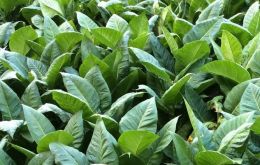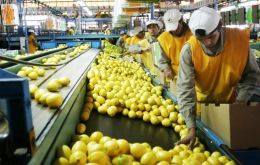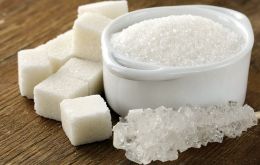MercoPress. South Atlantic News Agency
Agriculture
-
Thursday, July 13th 2017 - 09:05 UTC
UK embassy in Uruguay readying for Expo-Prado 2017; Falklands will also attend

Following the previous edition’s success, the British Embassy in Uruguay will be present for the fourth consecutive year at the agricultural show, Expo Prado, from 6 - 17 September, with a Pavilion centered on business, education, culture, gastronomy and entertainment, including a Falkland Islands stand.
-
Tuesday, July 11th 2017 - 08:00 UTC
Scottish shearer tackles more than 2.000 sheep in 50-hour endurance challenge

A shearer from south west Scotland has tackled more that 2,000 sheep in a 50-hour endurance challenge. Grant Hurcomb was raising funds for Cancer Research UK and MND Scotland.
-
Thursday, July 6th 2017 - 10:17 UTC
Soybeans and corn record crops challenge Brazil's storage capacity

Brazilian farmers are discovering a serious obstacle to becoming one of the world’s top producers of soybeans: they’re running out of room to store all the unsold supply. The biggest harvest in the country’s history is poised to leave domestic inventories at a record, data from the processors’ group Abiove show.
-
Wednesday, July 5th 2017 - 01:34 UTC
Tobacco 2017 harvest a boost for Cuban economy

Cuba's economy is to receive a significant boost from one of its main industries, as tobacco leaf production reached 19,000 tonnes this year, the best harvest of the last decade, it was announced Tuesday in Havana. The figure represents success, but it is still far below the 30,000 tonnes from early estimates.
-
Wednesday, June 28th 2017 - 02:10 UTC
Argentina resumes exports of lemons to Brazil

A shipment of 1,400 boxes (21,000 kilograms) from the province of Tucumán has already crossed the border by land on its way to the Sao Paulo Central Market, the national Agriculture Ministry reported Tuesday. Lemon exports to Brazil had been halted in 2009.
-
Wednesday, June 7th 2017 - 07:18 UTC
Brazilian meat packer Minerva buys JBS plants in Mercosur member countries

The Brazilian meatpacking giant JBS says it has sold its units Mercosur members, Argentina, Paraguay and Uruguay to companies controlled by a rival meat processing company in Brazil. JBS said in a Tuesday securities filing that it sold meat processing plants in the three countries for US$300 million to Minerva in Sao Paulo state.
-
Tuesday, June 6th 2017 - 07:33 UTC
“Pink slime” trial: beef plant demanding US$ 5.7bn from ABC for “fake news”

A trial has begun in South Dakota over a meat processer's claim that it was defamed by ABC News reporting that dubbed its product “pink slime”. Beef Products Inc (BPI) argues ABC and its journalist ruined its reputation in 2012 reports on “lean finely textured beef”, as the industry calls it.
-
Sunday, June 4th 2017 - 12:07 UTC
Brazil record trade surplus and industrial production up 0.6% in April

Encouraging news for Brazil's economic recovery: industrial output increased in April for the first time since December and the trade surplus rose to a record US$ 7.661bn during May, according to government data. Exports boosted by a record soy crop and rising auto sales reached US$ 19.8bn and imports US$ 12.2bn
-
Wednesday, May 31st 2017 - 06:16 UTC
Falklands Annual Address: a confident community's proud report planning for the future

Falklands' Acting Governor Alex Mitham looks back on the past year of activity for the Falkland Islands Government. The ceremony took place on Tuesday morning at the Court and Assembly Chambers during the Budget meeting of the Legislative Assembly
-
Tuesday, May 23rd 2017 - 14:55 UTC
Global food prices down with expectations of robust supplies in key staples

Global food commodity prices fell in April amid expectations of ongoing robust supplies of many key staples. The FAO Food Prices Index averaged 168 points in April, down 1.8% from March although remaining 10% higher than a year earlier.